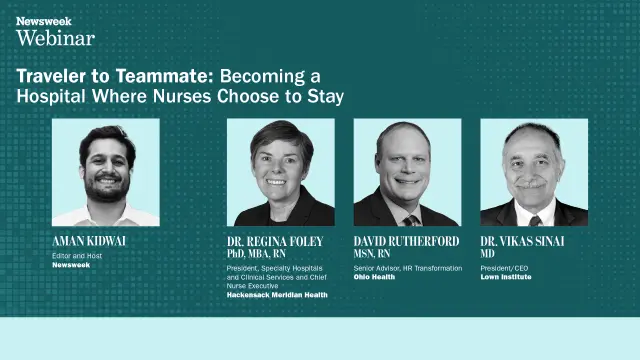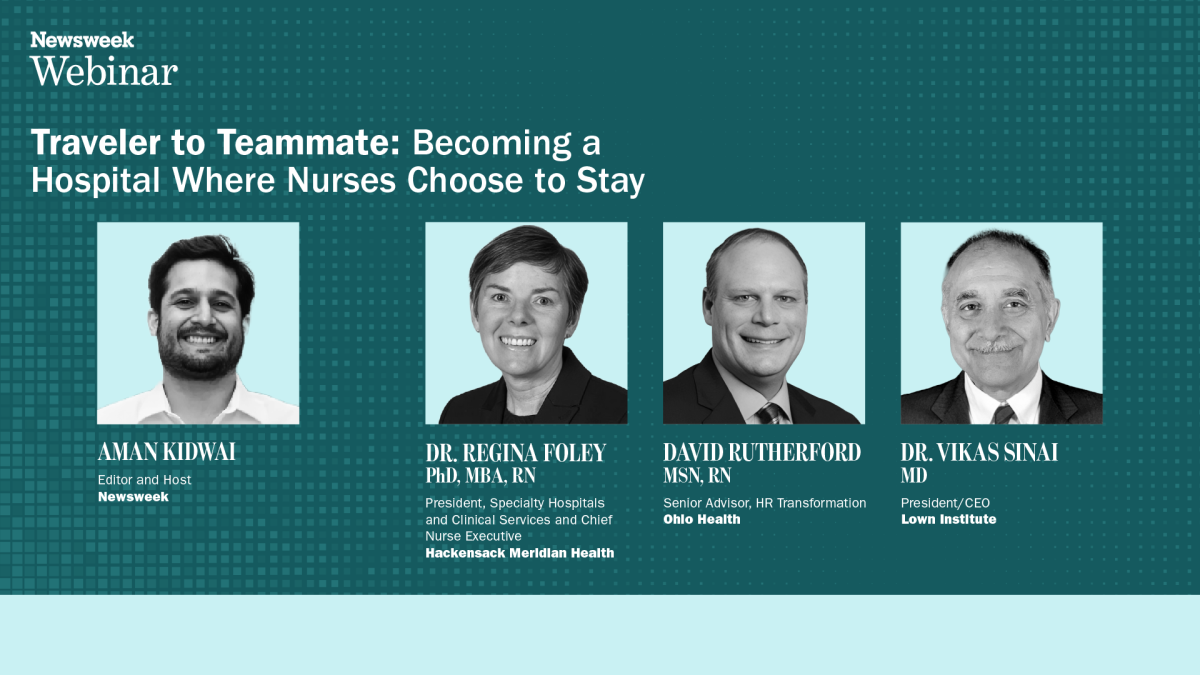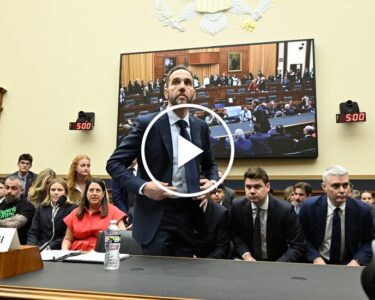The health care workforce was among hospital CEOs’ top concerns at the start of the year—but at a recent Newsweek event, two health system leaders said that nursing vacancy rates are the lowest they’ve been in years.
On Wednesday, November 19, Newsweek’s Workplaces Editor Aman Kidwai hosted a virtual event to explore how health systems are converting traveling nurses into full-time staff members. The webinar convened experts in health care research, human resources and clinical services to discuss best practices for retaining skilled nurses from contracting agencies.
“Hospitals and health systems have a mandate to emphasize strong benefits and career opportunities for their nursing staff,” Kidwai said in his opening remarks. “Otherwise, people are likely to look elsewhere. This can lead to understaffed teams and a reliance on contingent or contract teammates, and prolonged financial and cultural challenges.”
The panelists included Dr. Regina Foley, chief nurse executive and president of specialty hospitals and clinical services at Hackensack Meridian Health; David Rutherford, senior advisor for HR transformation at OhioHealth; and Dr. Vikas Sinai, president and CEO of the Lown Institute.
Several factors led to hospitals’ overreliance on contract labor, the panelists agreed. Approximately 100,000 nurses left the health care workforce during the COVID-19 pandemic, and hospitals looked to contract nurses to fill the vacancies.

However, this wasn’t a sustainable solution. Temporary nurses’ wages soared alongside demand for their services, and hospitals ended up paying the average travel nurses $16 more per hour than staff nurses with the same skills and credentials, according to one analysis from Vivian Health.
Coming out of the pandemic, “wage inflation was almost guaranteed,” Sinai said at Newsweek’s webinar.
He pointed out a few other trends contributing to staff vacancies: the K-shaped economy (a phenomenon where high earners are thriving financially, but lower-income workers are not) and the wave of Baby Boomer retirements. Flaws in the health care system itself could also be driving people out of nursing roles, he suggested. Some people who went into health care for moral reasons may be turned off by the industry’s structure and economics.
“I’m thinking of it as the money-versus-meaning tension, and I feel that’s been going on in health care for quite a while,” Sinai said. “It’s not just from the pandemic, but it feels like it’s coming to a head in many ways.”
Rutherford and his colleagues at OhioHealth have been chipping away at this issue for years, he said. Their nursing vacancy rate is now the lowest that it’s been since before the pandemic.
The 16-hospital system assembled a “multi-modal workforce strategy that addresses all components of the problem,” according to Rutherford. But they knew that it could take up to six years to fulfill it, and asked what they could do immediately to bring vacancies down.
“[We] started working on some of those contract conditions that people are attracted to,” Rutherford said. “Why are people in these contract jobs? Is it because they’re not satisfied with their home hospital? Is it because they want flexibility? Is it because the pay is that much more extreme?”
“And then it’s our job as the hospital operations teams and the HR teams to say, how can we do the same thing?” he continued. “How can we make an environment where it’s a competitive marketplace for people to get earned wages that are relevant to them, and then also provide that flexibility and the attractiveness that they saw when they went to those travel jobs to begin with?”
Upon further examination, Rutherford and his team realized that some travelers were extending their contracts with OhioHealth between four and 10 times. This proved that there was something special about their organization—they just needed to identify that value proposition and market it appropriately.
OhioHealth hosted listening sessions with travel nurses and identified three reasons why people chose contract gigs: higher wages, flexibility and the pressure to pay off their debt. They began adjusting their contracts to offer nurses similar benefits, and emphasized the potential payoffs of planting roots.
“We wanted to make sure that they knew that there are benefits to permanency, that there’s benefits to having stability within their finances,” Rutherford said, “highlighting for them that while you can make short-term, quick gains [with travel nursing], there’s no guarantee there.”
Culture can also be a magnetic force, according to Foley. Her health system, Hackensack Meridian Health, headquartered in Edison, New Jersey, is also experiencing its lowest nurse vacancy rates in years. As a registered nurse herself, Foley understands that clinicians take pride in their work and want to feel proud of their organization, too.
“We do have brand loyalty,” she said. “We have brand recognition, and the workforce wants to be part of something special. So that, to me, is a foundation that you have to cultivate. You feed it.”
Active listening has become a focus for Hackensack Meridian’s leadership teams as they work to “feed” that sense of pride. They hope to make nurses feel valued by listening to their needs—from leadership development opportunities to recognition—and creating programs that address them.
Hackensack Meridian heard that flexible scheduling was important to many of their nurses, and has significantly reduced reliance on contingency workers by creating an internal float pool. About 250 former travel nurses have signed onto the pool, which allows them to pick up shifts at their desired sites within the health system.
“Our agency utilization has dramatically reduced in recent years, by design, as well as a lot of leadership development and retention efforts,” Foley said. “That’s leading to a pretty, healthy work environment, as well as setting the stage of what the future brings to us.”
Sinai echoed that a palpable, positive workplace culture can encourage travel nurses to become full-time teammates.
“As the young would say, what’s the vibe?” Sinai said. “Holistically, what’s the culture? Being in a place where it’s not just talk, but it’s felt, it’s perceived that you are a member of the community, that this institution is really making a difference and in it’s not just in its rhetoric, but it’s behavior and its actions…I think those elements can go a long way to creating an environment in which people feel that it’s hard to go somewhere else when you’ve got that here.”
All of the panelists emphasized their gratitude for the travel nurses who contributed during the pandemic, and Foley and Sutherford reiterated their commitment to make health systems healthier places to work.
“We need you,” Foley said, addressing aspiring nurses who might be listening to the conversation. “We need you in the greatest profession known to mankind.”
👇Follow more 👇
👉 bdphone.com
👉 ultractivation.com
👉 trainingreferral.com
👉 shaplafood.com
👉 bangladeshi.help
👉 www.forexdhaka.com
👉 uncommunication.com
👉 ultra-sim.com
👉 forexdhaka.com
👉 ultrafxfund.com
👉 bdphoneonline.com
👉 dailyadvice.us




